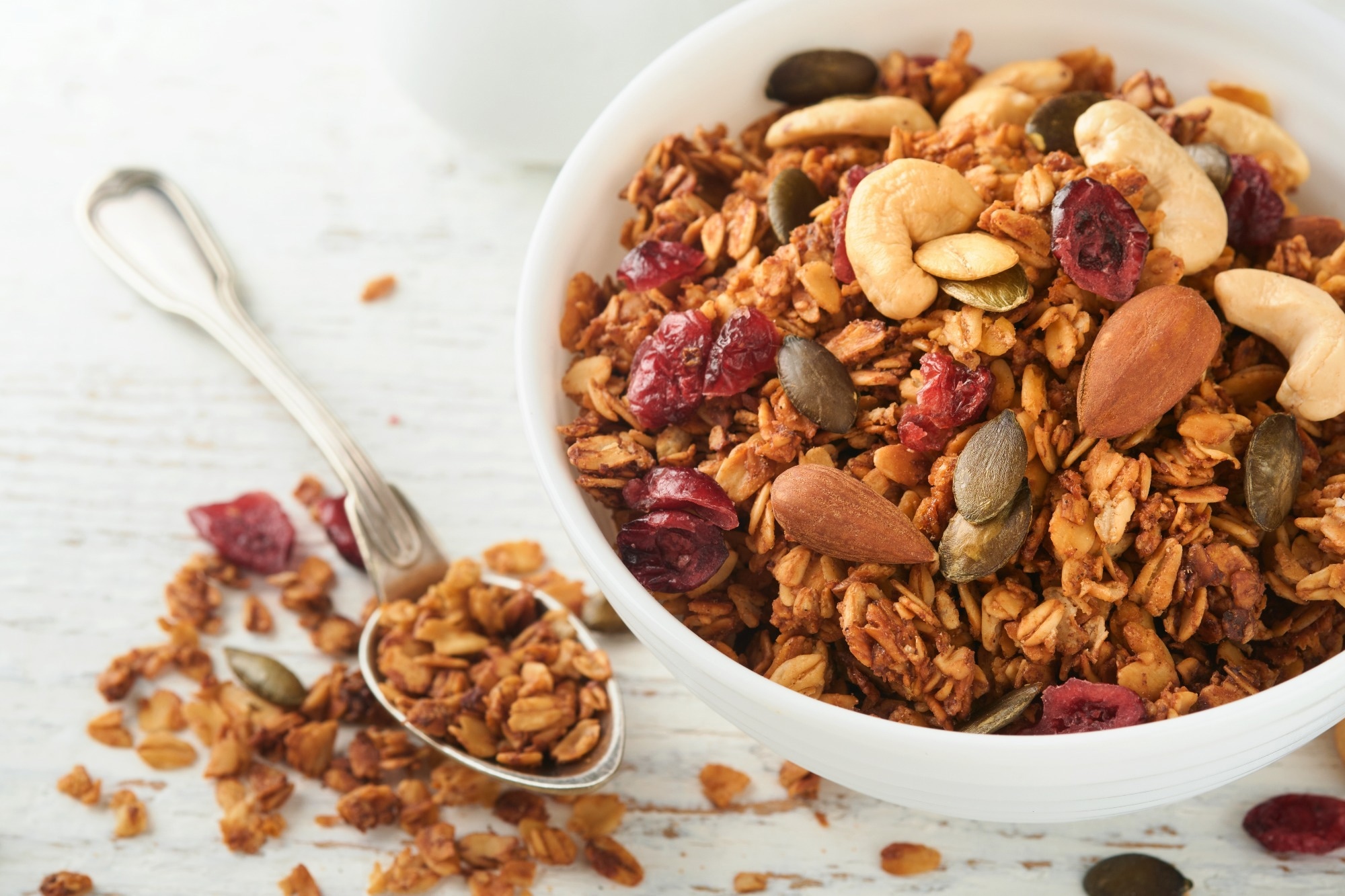A daily bowl of custom granola could lift your mood and reshape your gut, if it matches your microbes.
 Study: Effectiveness of personalized granola tailored to the gut microbiota for improving gut environment and mood states. Image credit: Katarzyna Hurova/Shutterstock.com
Study: Effectiveness of personalized granola tailored to the gut microbiota for improving gut environment and mood states. Image credit: Katarzyna Hurova/Shutterstock.com
A recent study in Frontiers in Microbiology evaluated the impact of personalized granola on an individual’s gut microbiota and mood states. Personalized granola tended to increase the production of some short-chain fatty acids (SCFAs) and some improved mood indicators, suggesting that tailored dietary interventions may optimize health outcomes.
Gut microbiota, granola, and overall health
The gut microbiota produces SCFAs that influence multiple physiological processes, including endocrine signaling, intestinal immunity, and neural function. Low SCFA production could lead to hypertension, obesity, and many other diseases. Research has shown that prebiotics (e.g., inulin) significantly influence gut microbiota composition and SCFA production.
Granola is rich in dietary fiber and a mixture of oats, rye, and other grains. Due to its high fiber content, it is believed to influence gut microbiota composition. Granola consumption has been linked to improved bowel movements, influences gut microbiota, and lowers blood pressure in hemodialysis patients. Research has shown that granola consumption can lead to increased Bifidobacterium, which is associated with improved mood, lower perceived stress, and lower subjective sleepiness.
The gut microbiota composition varies across individuals, highlighting the importance of precision and personalized nutrition. Personalizing dietary interventions may help improve risk factors for type 2 diabetes and obesity. However, only a few studies have explored the administration of prebiotics tailored to an individual’s gut microbiota.
About the study
The current study identified gut bacteria that promote SCFA production by actively metabolizing specific prebiotics and devised personalized granola (BodyGranola®, Calbee, Inc.) based on this information. The goal was to assess the efficacy of personalized granola, hypothesizing that it would significantly enhance the production of SCFAs and other metabolites. The impact on mental health indicators and stool frequency was also evaluated.
A single-blind, single-arm, pre- and post-study was conducted using a sample of 99 individuals. The study involved tailoring granola to each individual's gut microbiota composition by incorporating three prebiotic ingredients from six options: galacto-oligosaccharide, barley, fructo-oligosaccharide, inulin, resistant starch, and Hi-Cacao.
For 8 weeks, individuals consumed 50 g of granola daily. The 16S rRNA gene sequencing and gas chromatography-mass spectrometry methods were used to analyze gut microbiota and intestinal metabolites. To do so, fecal samples were collected at baseline and at the 4-week and 8-week time points. Defecation questionnaires, the Athens Insomnia Scale (AIS), and the Profile of Mood States Second Edition (POMS2) were used to evaluate defecation and mood.
Study findings
Overall, the levels of organic acids, excluding the main SCFAs, increased post consumption of personalized granola, regardless of gut microbiota type, between baseline and week 8. The results showed that acetic acid levels showed an upward trend, and caproic acid increased significantly between the baseline and week 8. The opposite was noted for formic acid. The levels of caproic acid showed marked differences between the baseline and week 4, as well as between the baseline and week 8. Lactic acid levels exhibited an increasing trend, while succinic acid levels increased significantly.
The type of organic acid produced depended on the type of gut microbiota. For example, caproic, lactic, and succinic acid increased significantly in the BaBiBl type. Furthermore, caproic acid, butyric acid, and 2-methylvaleric acid increased in the BaBiF type.
Consuming personalized granola did not significantly alter the overall composition of the gut microbiota. Bifidobacterium increased, while Faecalibacterium and Bacteroides tended to decrease, and no significant changes were observed in Blautia. A significant reduction in Chao1 and Shannon diversity indices was noted, although this may reflect changes in relative abundance rather than an actual loss of diversity.
The POMS2 assessment revealed improvements in vigor-activity (VA) and total mood disturbance scores, while AIS showed no significant changes. The scores for bloating and gas worsened, while stool volume increased significantly.
The disturbances in physical and mental states depended on the type of gut microbiota. For example, VA significantly improved between baseline and week 4, and insomnia disturbance significantly improved between baseline and week 8, in the BaBiBl type.
Furthermore, the VA in the BaFBl type improved substantially between baseline and week 8, and in the BaBiF type, between baseline and week 4; anger-hostility significantly improved. All microbiota types showed a marked increase in stool volume, except BaPF. All types except BaBiBl showed a substantial increase in gas accumulation.
Conclusions
The results showed that personalized granola can enhance metabolite production, promote beneficial bacterial growth, and improve specific physiological and psychological outcomes depending on the microbiota type. A key limitation of the study is its consideration of only six bacterial genera and their corresponding prebiotic toppings. However, there is no strict one-to-one relationship between prebiotics and gut bacteria, and the matching was based on previous literature rather than functional validation. Furthermore, a broader range of ingredients could be explored to select prebiotic toppings.
Another limitation concerns using a single group for pre- and post-comparison, which does not fully account for potential placebo effects. The absence of a control group consuming either base granola or mismatched prebiotics made it challenging to identify whether the observed effects were driven by the specific prebiotics or the base granola itself. Dietary intake during the study was also not standardized, and some participants consumed probiotic foods, introducing potential confounding effects.
Lastly, while personalised granola may offer health benefits, the frequency of adverse gastrointestinal symptoms was notable, with over two-thirds of participants reporting increased gas. This suggests that high intake of fermentable prebiotic fibers, particularly inulin, may lead to discomfort in some individuals.
Download your PDF copy now!